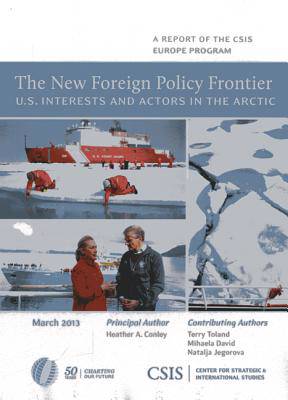
- Afhalen na 1 uur in een winkel met voorraad
- Gratis thuislevering in België vanaf € 30
- Ruim aanbod met 7 miljoen producten
- Afhalen na 1 uur in een winkel met voorraad
- Gratis thuislevering in België vanaf € 30
- Ruim aanbod met 7 miljoen producten
Zoeken
€ 90,45
+ 180 punten
Omschrijving
Since World War II, the Arctic has been a region of geostrategic importance to the United States. As unprecedented environmental transformation occurs in the Arctic, this region will increase in significance. When historians look back at this critical opportunity to develop U.S. Arctic policy, we do not want the question to be posed, "Who lost the Arctic?" but rather, "How did the United States win the Arctic?" Crafting U.S. policy toward the Arctic, however, is a complex and challenging undertaking. Arctic policy must respond to the economic, environmental, security, and geopolitical concerns that confront the region. When the Barack Obama administration came into office in January 2009, it accepted and left unchanged the recently adopted Arctic strategy of the George W. Bush administration. In its second term, it is now time for the Obama administration to enhance U.S. Arctic policy by updating and prioritizing National Security Presidential Directive 66/Homeland Security Presidential Directive 25 (NSPD-66/HSPD-25), improving interagency cooperation, enhancing U.S. international and public diplomacy related to the Arctic, and increasing the focus of senior U.S. officials. These activities must begin now if the United States is to prepare for and fully maximize its chairmanship of the Arctic Council beginning in 2015.
Specificaties
Betrokkenen
- Auteur(s):
- Uitgeverij:
Inhoud
- Aantal bladzijden:
- 100
- Taal:
- Engels
- Reeks:
Eigenschappen
- Productcode (EAN):
- 9781442224612
- Verschijningsdatum:
- 7/06/2013
- Uitvoering:
- Paperback
- Formaat:
- Trade paperback (VS)
- Afmetingen:
- 216 mm x 279 mm
- Gewicht:
- 254 g

Alleen bij Standaard Boekhandel
+ 180 punten op je klantenkaart van Standaard Boekhandel
Beoordelingen
We publiceren alleen reviews die voldoen aan de voorwaarden voor reviews. Bekijk onze voorwaarden voor reviews.











